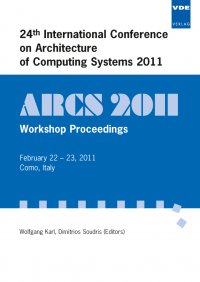Runtime Tuning of Dynamic Memory Management For Mitigating Footprint-Fragmentation Variations
Konferenz: ARCS 2011 - 24th International Conference on Architecture of Computing Systems
22.02.2011 - 23.02.2011 in Como, Italy
Tagungsband: ARCS 2011
Seiten: 10Sprache: EnglischTyp: PDF
Persönliche VDE-Mitglieder erhalten auf diesen Artikel 10% Rabatt
Autoren:
Xydis, Sotirios; Stamelakos, Ioannis; Bartzas, Alexandros; Soudris, Dimitrios (National Technical University of Athens, School of Electrical and Computer Engineering, Microprocessors and Digital Systems Laboratory, Greece)
Inhalt:
In this paper we explore the opportunities of effectively tuning at runtime the Dynamic Memory Management (DMM) mechanisms for mitigating memory variations in fragmentation-footprint constrained Multi-Processor Systems-on-Chip (MPSoCs). We focus our study on memory fragmentation due to its dependency on the runtime system behaviour, which cannot be easily captured during design-time analysis. The proposed runtime-tuning techniques can be applied either to general-purpose (in case that the application set is unknown during design-time) or to application-specific Dynamic Memory (DM) managers (in case that the application set is a priori known to the designers). We perform a thorough analysis in order to extract a set of runtime-tunable DMM parameters, which can heavily influence the behaviour of the DMM without exhibiting large reconfiguration overheads. Based on the extracted parameter set, we propose a systematic methodology for lightweight decision making of the tuning knobs during runtime. We evaluate our approach on a representative case study from the network domain, regarding a multi-threaded server application. Experimental data shows that the proposed runtime techniques are very efficient in keeping the system behaviour within specific design margins. In addition, we show that balanced DM manager implementations are delivered; reporting gains of 25,1% and 69,9% in footprint and fragmentation in comparison with a performance optimized static DM manager, while the same time gains of 35,2% are reported in execution latency in comparison with a fragmentation-footprint optimized static DM manager.


